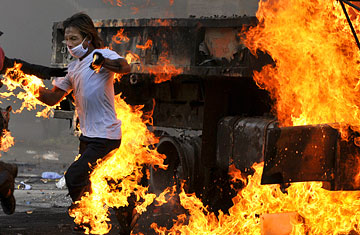
An anti-government protester flees a fire caused by a Molotov cocktail in central Bangkok
The Bangkok ice cream vendor was doing brisk business selling cooling coconut sorbet to motorcycle drivers and a police officer clad in a flak jacket. But just 500 feet (150 m) away, temperatures were raging. With smoke billowing from a barricade made of burning tires, dozens of people cowered under a highway overpass as gunfire and explosions rang out around them. Ten minutes before, a glassy-eyed man with a bullet hole above his heart had been loaded onto the back of a pickup truck to be rushed off to the hospital. At least 14 people, including an Italian journalist, were reported killed on Wednesday, in a bloody climax to the two-month standoff between the Thai government and the Red Shirt protesters, which has claimed more than 70 lives, including civilians and soldiers.
An hour later, as armored vehicles rumbled toward the heart of the anti-government rally site in a final push to clear out demonstrators from central Bangkok, Red Shirt leaders formally called off their demonstration. "We cannot resist these savages anymore," said protest leader Jatuporn Prompan, referring to the security forces who were making their way to the giant soundstage where Red Shirts had for weeks called for the dissolution of Prime Minister Abhisit Vejjajiva's government.
The momentous decision by Red Shirt honchos to end their thousands-strong rally, which has paralyzed Bangkok's business district and dealt a body blow to Thailand's reputation as a stable democracy, should have been good news. The government announced triumphantly that the military's security offensive, which began on Wednesday morning, had ceased. But even as Red Shirt leaders surrendered to the authorities on Wednesday afternoon — three main architects of the protest movement are still on the run — sympathizers wept and vowed to continue their anti-government movement. Red passions would not so easily be extinguished.
On Wednesday afternoon, a radio station aligned with the Red Shirt movement urged supporters to unleash "all-out arson." At least two provincial halls were torched in rural northeastern Thailand, a stronghold of Red Shirt support that is mostly drawn from the nation's poorer classes. Hours after the Red Shirt leaders had officially ended their protest, plumes of smoke darkened the Bangkok skyline, as rioters set fire to malls, buses, media offices and the nation's stock exchange. Bursts of gunfire echoed across town, and the government issued a curfew in the capital for Wednesday night, which was later extended to 21 provinces.
Before the bloodshed even began, the country's Finance Minister predicted that 2 percentage points could be lost from this year's GDP growth. Foreign tourists, whose cash helps buoy the local economy, have avoided Thailand, with many nations issuing warnings advising against all travel to the nation's capital.
Foreigners may be wise to shun Thailand a while longer. Red Shirt anger — and equally vehement anti-protest fervor — will likely only harden in the coming days. Thailand is dangerously divided. The man many Red Shirts consider their political savior — Thaksin Shinawatra, the Thai Prime Minister who was ousted in a 2006 coup and now lives in exile to avoid a jail sentence for abuse of power — told Reuters on Wednesday that "a military crackdown can spread resentment, and these resentful people will become guerrillas."
Thaksin's words may be just inflammatory rhetoric. But there's no question that Thailand's various institutions are poorly equipped to deal with the fallout from the worst political bloodshed the nation has experienced in decades. The country's disaffected citizens — whether Red Shirts or rival Yellow Shirts, who in earlier demonstrations called for the downfall of Thaksin and his allies — are now used to airing their grievances on the streets of Bangkok. The one man whom Thais had counted on to pull them back from the political brink, King Bhumibol Adulyadej, is ailing and has remained silent during the latest spate of violence. Even if elections are held in the coming months — a key demand of the Red Shirt protesters, who believe that Abhisit came to power illegitimately — the campaign season promises to be poisoned and possibly bloody. The Red Shirt rally may have ended for now, but the battle lines remain drawn. And Bangkok continues to burn.
— With reporting by Robert Horn / Bangkok
